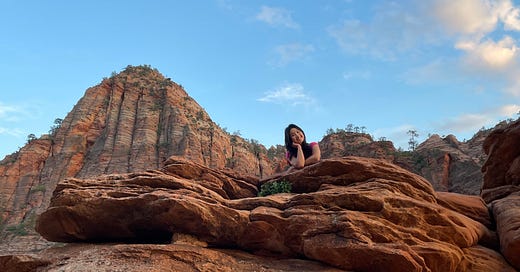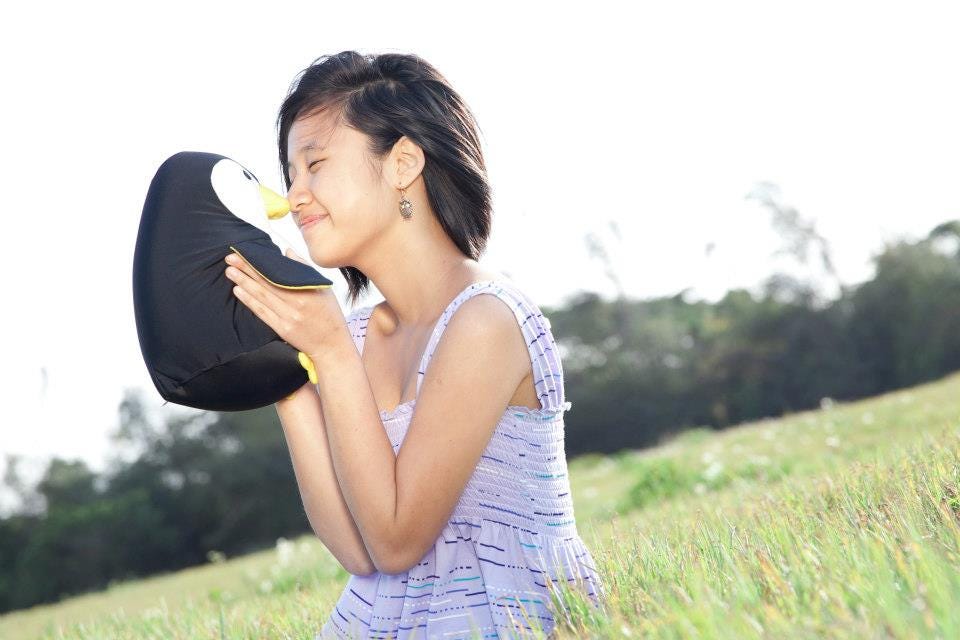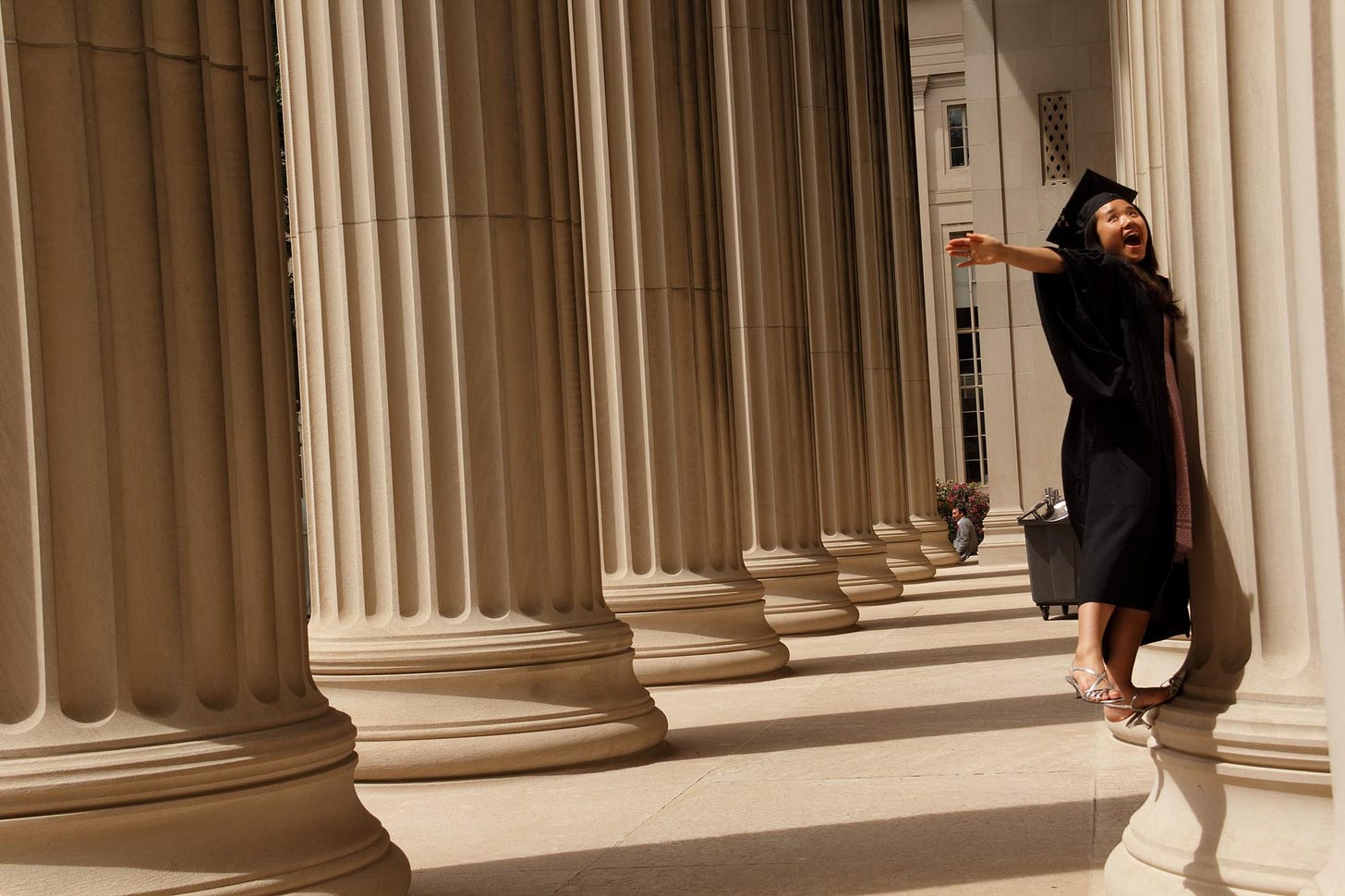This summer (August 2023) marked my 10-year anniversary in the US. I also happen to be at a crossroads in life, wrapping up one chapter and deciding where I want to go next. When a mentor asked me, “how are you going to celebrate?”, I was taken aback. I didn’t think there was a reason to celebrate. But he had an interesting point - I’ve packed a lot of life into these 10 years, and the journey is worth taking stock of and maybe even sharing, in case it could be helpful to someone else.
A dark horse from Taiwan
I spent the first 17 years of my life in Taichung. I attended a small missionary school K-12, flying under the radar with a strong underdog mentality. I had no framework or role model for getting into elite universities in the US, and yet I had this faith that I belonged there.
My M.O. has always been to carve out my own path with little regard for convention. I convinced my high school to grant me credit for an independent study curriculum that I cobbled together from online home school programs. I created the school’s first international delegation to a Model UN conference in Singapore. When I swept up acceptance letters across the Ivy League, I suddenly became a household name among the expat circle in Taiwan. People whispered, “who is this girl? why haven’t we heard of her? what’s her secret?”
I learned early on that you can defeat the odds when you stay true to who you are. No one gets to tell you what’s possible, what you’re capable of, and who you should be.
Finding home at MIT
I chose to attend college at MIT, so I waved goodbye to my family in 2013 and hopped on a plane to Boston. MIT is where I really grew into myself with the support of people who believed in me and challenged me to think bigger. It was a hard-earned transformation. The workload was crushing and I felt self-conscious around all the people who were way smarter than I’ll ever be. But MIT always encouraged me to dream and think about how I can change the world. The subliminal message was always, “you can”.
I was an eclectic kid. I majored in materials science, minored in international studies, and concentrated in Spanish, all the while checking off pre-med boxes. During my semesters on campus, I devoted myself to bioengineering research in lab and playing for a piano scholarship. But whenever we hit winter and summer breaks, I left the country in a heartbeat to work in some faraway land. In four years, I organized startup bootcamp in Sri Lanka; led workplace training for adults with disabilities through a nonprofit in India; conducted child development policy work with UNICEF in Chile; ran design thinking processes with farmers in Zambia; mapped the technology assessment landscape for the World Health Organization in Switzerland; and taught high school in Israel. I was hardcore manifesting my life: I would set my sights on a particular organization in a specific country, cold email someone who worked there, and convince them to create a role for me.
By the time I graduated from college, I had developed a career mission to develop and disseminate technologies for global health. But I didn’t know what this overarching vision would look like in practice.
Medicine wasn’t my calling
I got cold feet when deciding where to go for medical school. I couldn’t see myself in the hospital day in and day out for the rest of my life. I accepted a spot at the University of Pennsylvania, deferred my enrollment, and looked for a job in the pharmaceutical industry a month before college graduation. I worked at Novartis on facilitating external relations with academia for early drug discovery. By the end of my year in industry, I was eager to be a student again and learn in an academic environment. I still wasn’t sure how to integrate clinical, global health, and technological work into one career, but I moved to Philly hoping that I’d figure it out.
In some ways, medicine was a good fit. I liked taking care of people and working in teams; I liked thinking clinically about illness; I especially liked the operating room and would sometimes achieve flow state during surgical cases. But I was too contrarian, unmotivated to memorize and regurgitate minutiae, and bored of rigid mental and cultural frameworks. Medicine is highly structured and risk-averse for good reason — patient safety comes first and any mistake is costly, so you want reliable processes with multiple levels backing you up. It ultimately just wasn’t enough creative range for me, and I felt like I was in my zone of competence but not my zone of genius.
I struggled with the question of whether to proceed with residency throughout all of medical school. The answer came in my last year, during an uncomfortable zoom call with an administrator who accused me of trying to bypass Penn’s intellectual property policies. I had started a side project to make a wearable material that substitutes ice packs without a melting mess and reliance on freezers. I wanted to retain ownership of the technology and see it through, from conception to development to deployment. To avoid institutional entanglements, I cancelled my residency plans, graduated with my MD, and turned the passion project into a startup called Eztia.
Building out of thin air
At Eztia, we built hard tech 0 to 1 in 1.5 years on a scrappy budget. While the quest to re-invent human cooling and the material technology remained constant, Eztia went through a few pivots. Our first product concept was actually a women’s health consumer product, inspired by the main reason I used ice packs in the first place. But after learning that our customer acquisition costs were going to be astronomical, we moved into the athletic market, where we found a more feasible path to profitability. Our internal vision was to tackle heat stress - protect people, such as athletes or frontline workers and vulnerable communities, from extreme heat in the face of climate change with a technology that uses water instead of electricity. Our public-facing story and go-to-market strategy were admittedly more in flux. I was trying to balance projected profits, customer messaging, investor zeitgeist, and the kind of impact that would really move a needle, all at the same time.
We achieved proof-of-concept for the material technology in lab and built a first-generation prototype. We collected letters of intent from sports retailers and networked our way through the outdoor industry, in light of our original plan to start with outdoor endurance athletes and then move into enterprise channels for heat safety. After a year of bootstrapping in Philly, I moved to Silicon Valley. This was my go / no-go point: I’d do everything I can to raise a solid funding round that would enable Eztia to really take off, otherwise it’s a bust.
Fundraising was brutal. I struggled to compete with AI startups and climate hardware founding teams who were former execs at Google and Tesla. The psy ops warfare wore me down: I navigated strange conditional asks that ended in ghosting and tolerated demeaning comments. My hair was falling out and I ate ice cream for breakfast every day to emotionally cope. I felt like I was losing my sense of direction, catering to too many other stakeholders and not my own heart. Above all, for the first time in my life, I had stopped believing in myself. I still believed in the problem and the solution, but I didn’t believe in me.
This was a dangerous place to be. So I stopped fundraising, wound down operations to baseline, and carved out some time to hit reset. I needed emotional and mental distance from the startup, to look at the chess board from different angles and allow myself to conjure a new frame, with full openness to whatever that form would take.
Decade #2: Commitments
I’m writing this piece during my sabbatical. I have cried and grappled with feelings of shame, guilt, and failure. I have hiked, laughed, and processed with people who love me unconditionally. I am re-centering on what I find fulfilling, because if I’m going to spend the rest of my career pouring sweat, tears, and years into building something, it better bring me a ton of joy and meaning. Reading through my old essays showed me that rather than pitching the next healthcare materials company, a younger me dreamt of building an organization that leads a pipeline to create, test, deploy, and scale technologies for global health in resource-limited settings.
I don’t know what the immediate future holds. I suspect that I’ll be moving back into the non-profit / public sector, hopefully continuing to work at the intersection of health, climate, and technology. Maybe I’ll be moving forward Eztia’s technology to serve international communities without access to power; maybe I won’t. Maybe I’ll start building that global health tech organization I’ve been thinking about for 10 years, or maybe I’ll save it for later. But what I do know is that the next decade will be one of making and honoring commitments — to a vocation, a philosophy, a family, and a community (see David Brooks’ speech). I can’t wait to live out what’s in store, and I’m grateful to every person who has supported me along the way.









This is so beautiful - thank you for so vulnerably sharing your story, for normalizing the ups and downs, and sharing your reflections with us <3
Tiffany, I want you to know that the very strength of my heart is with you no matter what happens or where you go. I am proud of you and so proud to have you in my life. I will consider it my personal mission to always remind you, in many different ways, how wonderful you are!